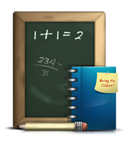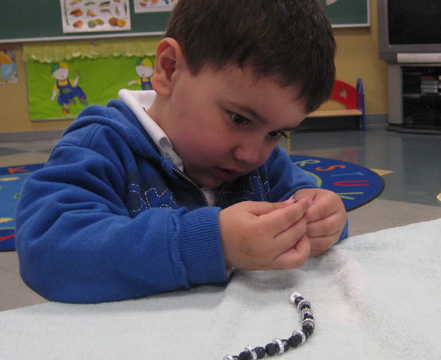NOTE
The PS (3 years old) is admitted to the Garderie Providence (Pavillon Annex to the Providence Academy). The enrollement is based on a first-come first-serve basis.
FOR MORE INFORMATION: please contact us at 613-744-0010, or refer to our website of the Centre Éducatif Providence Soeurs Antonines www.ceprovidence.ca →
Register your child in
our Providence Educational Centre
Learn MoreLearning content of Nursery PS
Religious and moral awakening (Express the wonder of God and admiration for the life and the environment)
Stimulating activities that promote moral and religious awe to God, the author of creation; expressing religious feelings; learning to act with others in friendship and hospitality; distinguishing what is acceptable and what is not acceptable.
Mobilize French language in all its dimensions : Spoken and written
Understand an instruction given by an adult; be able to answer questions; understand a story; discuss collectively; comment on an event. Graphic activities: properly hold a pencil, brush or marker; draw on all the space of a sheet; begin to control his actions.
Develop the primary tools to structure one’s thinking (Develop numbers, express quantities, explore shapes, sizes, organized sequences)
Count up to 5 and differentiate between numbers up to 3; count and compare very small collections; rebuild a fragmented image (puzzle, tiles ...); differentiate overall figures and shapes by sight and touch; reproduce the circle and recognize the shapes: triangle and rectangle; compare, classify and arrange items according to shape or size; organize and assemble stackable and construction sets.
Explore the world (Locate oneself in time and space, explore the living and non-living world and matter)
Locate oneself in time, distinguish days of the week; have a first notion of past time (day, week, month, year ...); locate in space using a spatial vocabulary (in front, behind, above, below); discover living organisms, parts of the body, the five senses; apply hygiene rules (body, health, nutrition, locations); discover the environment, objects and matter.
Perform, express oneself, understand through physical activities (Perform in space, in duration and on objects, adapt movements, communicate, cooperate, compete)
Act and express with the body: running, jumping, throwing to break a record, moving with unstable elements (bicycles, tricycles, scooters ...); participate in team games: throwing, running, catching, avoiding ...; dance to a rhythm.
Perform, express oneself, understand through artistic activities (Development of taste, the plastic and visual creations, the world of sound, live shows)
Develop perception, sensitivity, imagination, and ability to create through visual activities; practice drawing, painting, and modeling; develop listening through vocal activities, rhythmic; develop capabilities to organize space by rhythmic dances, theater, acting, and role playing.
Become a unique person within a group (Learn together, live together, learn to cooperate, become a student)
Learn the rules of civility and principles of behavior in accordance with morality; learn to communicate, share activities; learn to cooperate, assist, engage, build relationships with peers and adults; learn to become autonomous; understand school life and living together.
Learning Content of Nursery II, Kindergarten I and II ( MS, GS)
Religious and moral awakening (Express the wonder of God and admiration for the life and the environment)
Stimulating activities that promote moral and religious awe to God, the author of creation; expressing religious feelings; learning to act with others in friendship and hospitality; distinguishing what is acceptable and what is not acceptable.
Mobilize the French language in all its dimensions: Spoken and written
UTalk and build a French vocabulary; share; express oneself; understand a friend who speaks; understand instructions; progress in oral proficiency; acquire vocabulary; become familiar with the writing; prepare to learn to read and write.
Develop the primary tools to structure one’s thinking (Develop numbers, express quantities, explore shapes, sizes, organized sequences)
Count up to 30, differentiate the numbers up to 10 and recognize the order of the numbers; express quantities and numbers; discover shapes and sizes; use terms that express measurement; identify a simple shape: circle, square, rectangle, triangle, diamond and reproduce a circle; organize patterns according to shape criteria; make a collection according to a pattern.
Explore the world (Locate oneself in time and space, explore the living and non-living world and matter)
Locate oneself in time, realize that time passes: yesterday, today, tomorrow ... locate in space using a spatial vocabulary; discover the living world: breeding, planting, parts of the body, the five senses; learn the rules of hygiene of life: health, nutrition, respect of life; discover objects, understand their use. Discover matter, identify its characteristics.
Perform, express oneself, understand through physical activities (Perform in space, in duration and on objects, adapt movements, communicate, cooperate, compete)
Explore the possibilities of the body in various situations; develop coping skills and cooperation; develop body expression: body language, rhythm; learn to explore a given space, to move in a specific space; acquire oriented body image.
Perform, express oneself, understand through artistic activities (Development of taste, the plastic and visual creations, the world of sound, live shows)
Develop perception, sensitivity, imagination, creation: explore different artistic forms (drawing, painting, collage, making object); develop listening and voice; learn and recite rhymes, poems and songs; develop its capacity to organize space.
Become a unique person within a group (Learn together, live together, learn to cooperate, become a student)
Learn the rules of civility and principles of behavior in accordance with morality; learn to communicate, share activities, cooperate, assist, engage, build relationships with peers and adults; learn to become independent; understand school life and living together.
International Language (Arabic Language)
Develop language and oral communication; learn the basics of the language of origin: 28 alphabetic letters gradually spread over 24 modules, depending on their phonetic: 25 consonants supported by three vowels a - o - i and the four main accents; prepare to read and write.




